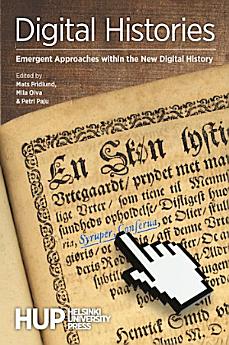Digital Histories: Emergent Approaches within the New Digital History
About this ebook
Digital Histories showcases this emerging wave of digital history research. It presents work by historians who – on their own or through collaborations with e.g. information technology specialists – have uncovered new, empirical historical knowledge through digital and computational methods. The topics of the volume range from the medieval period to the present day, including various parts of Europe. The chapters apply an exemplary array of methods, such as digital metadata analysis, machine learning, network analysis, topic modelling, named entity recognition, collocation analysis, critical search, and text and data mining.
The volume argues that digital history is entering a mature phase, digital history ‘in action’, where its focus is shifting from the building of resources towards the making of new historical knowledge. This also involves novel challenges that digital methods pose to historical research, including awareness of the pitfalls and limitations of the digital tools and the necessity of new forms of digital source criticisms.
Through its combination of empirical, conceptual and contextual studies, Digital Histories is a timely and pioneering contribution taking stock of how digital research currently advances historical scholarship.
About the author
Mats Fridlund is Associate Professor in History of Science and Ideas and Deputy Director for the Centre for Digital Humanities at the University of Gothenburg, Sweden. He has a PhD in History of Technology from KTH Royal Institute of Technology, Sweden. His research focuses on cultural and political history of science, technology and materiality. He has been Principal Investigator for two Kone Foundation projects to strengthen digital history in Finland and has published on topic modelling in historical studies and used digital methodologies to study history of terrorism and Chinese industrialisation. ORCID: https://orcid.org/0000-0002-
Mila Oiva is a cultural historian, digital humanist and an expert on Russian and Polish history. She has a PhD in Cultural History from the University of Turku, Finland, and has worked as post-doctoral scholar at Aalto University and the University of Turku. Currently she works as a post-doctoral Research Fellow at CUDAN Open Lab at the Tallinn University, Estonia. Her main research interest focuses on circulation of information which she has studied in research projects on 19th-century global news flows and contemporary Finnish and Russian internet forum discussions on medieval history. ORCID: https://orcid.org/0000-0002-
Petri Paju is a cultural historian with research interests in the development of digital history and its uses, and in history of technology. He has a PhD in Cultural History from the University of Turku, Finland. He has previously worked in two Kone Foundation-funded projects based at Aalto University which studied and advanced digital history research in Finland since 2016, and in the Academy of Finland research project ‘Computational History and the Transformation of Public Discourse in Finland, 1640–1910’. He has written broadly on the history of technology in Finland and on computing history in the Nordic countries, as well as on the IBM Company in postwar Europe. ORCID: https://orcid.org/0000-0002-




